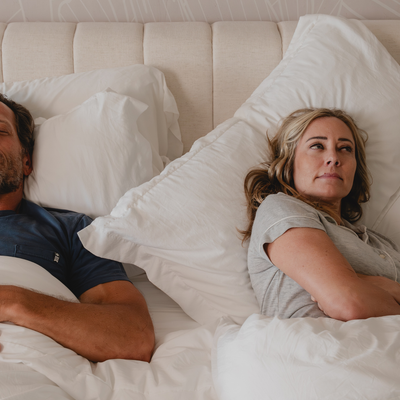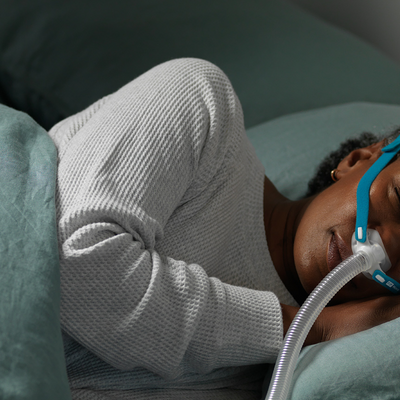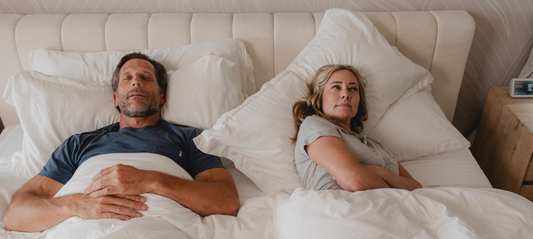Written by Nancy Kirk
October 21, 2024
Both Apple and Samsung smartwatches now feature sleep apnea detection, which will help spread awareness for this common yet underdiagnosed condition which affects as many as 25 million Americans.1 If you show signs of sleep apnea via the smartwatch, you must still be professionally diagnosed.
Fortunately, getting diagnosed with the Lofta At Home Sleep Apnea Test is easier than ever. Simply order a test straight to your door, wear the small device overnight, and get results within days with expert support. Signs of sleep apnea include loud snoring, gasping for air during sleep, daytime sleepiness, morning headaches, brain fog, and waking up with a dry mouth.
While both tech giants aim to contribute to better sleep health outcomes, they each have notable differences. Here’s what you need to know about how these two devices compare and what their features mean for users.
Samsung’s Approach to the Galaxy Watch
Samsung received FDA approval in February 2024 for its sleep apnea detection feature on the Galaxy Watch, which is focused on detecting moderate to severe cases. This detection runs through the Samsung Health Monitor app, leveraging bioactive sensors to track sleep patterns and potential breathing disruptions.
The sensors also monitor blood oxygen levels and other biological data. To activate the sleep apnea feature, users must track their sleep for at least four hours on two nights within a 10-day window. If signs of sleep apnea are detected, the app encourages users to seek further medical evaluation.
Apple’s New Sleep Apnea Feature on Apple Watch 10
Then Apple introduced its sleep apnea detection feature during its “Glowtime” event. The company unveiled several new health and wellness features on its latest devices, but the Apple Watch 10’s ability to detect sleep apnea stood out as a key innovation.
Unlike Samsung’s detection technology, the Apple Watch 10 uses advanced machine learning algorithms to monitor a user’s sleep patterns, focusing on a new metric called "Breathing Disturbances." The watch’s accelerometer tracks wrist movements during sleep, and if irregularities in breathing are detected over 30 days, the wearer will receive a notification to discuss with their physician.
The detection system was validated through a clinical study and received FDA approval in September of 2024. The data collected by the Apple Watch can also be exported to a PDF, allowing users to share it with healthcare providers for a more in-depth evaluation. While Apple’s feature won’t replace a professional diagnosis, it opens up more accessible routes to early detection, potentially helping the millions of undiagnosed people.
Key Differences Between Apple and Samsung’s Sleep Apnea Detection
While both companies are targeting the same issue, they are taking slightly different approaches in terms of technology and user experience:
- Data Collection: Apple uses wrist movements to detect sleep disturbances, while Samsung relies more on bioactive sensors that track biological signs like blood oxygen levels.
- FDA Approval: Samsung received FDA approval in February 2024 for its sleep apnea feature, whereas Apple received it in September of the same year.
- Detection Focus: Samsung’s detection specifically focuses on moderate to severe cases of obstructive sleep apnea. At the same time, Apple’s system provides a broader “Breathing Disturbances" metric to detect a range of breathing irregularities over time.
- User Involvement: Apple offers continuous monitoring with monthly reports, whereas Samsung requires users to track their sleep for a specified period to enable detection.
Why Detecting Sleep Apnea Early Is Important
Sleep apnea can lead to a variety of health issues, including cardiovascular disease, Type 2 diabetes, cholesterol, and even cognitive decline. Detecting the condition early can help users take steps toward managing it, whether through lifestyle changes or medical treatment, such as using a CPAP machine.
Apple and Samsung aim to give users greater insight into their nighttime health patterns, making it easier to act on any signs of sleep apnea. While these smartwatches won’t provide a medical diagnosis, they can be an essential first step in prompting users to seek professional help.
Does Sleep Apnea Affect Your Cholesterol?
How Sleep Apnea Affects Your Brain and Mental Health
Prioritize Your Sleep Wellness
Wearables like the Apple Watch and Galaxy Watch continue to evolve and raise awareness about sleep apnea. These devices offer more than just convenience; they shape how we approach health. At Lofta, we encourage users to be proactive about their well-being. Whether you’re using an Apple Watch or a Samsung Galaxy Watch, the potential to address conditions like sleep apnea can transform early detection.
The data these devices provide might push more to prioritize their health, especially those who don’t make regular doctor visits. While the technology is still evolving, the sleep apnea detection features on these smartwatches could be a game-changer for millions, helping to tackle this prevalent yet often overlooked condition.
Get Tested with Lofta
Don’t wait to take control of your health. With up to 80% of sleep apnea cases going undiagnosed, many people aren’t aware of the risks they’re living with. Our at-home sleep apnea test is easy, convenient, and could be the first step toward improving your well-being.
There is no need for a lab visit—just one night in your bed, and we’ll know if CPAP therapy is the right solution for you. Here’s what to expect when starting CPAP therapy. Protect yourself from the dangers of untreated sleep apnea, like heart disease, stroke, and depression. Take the test, and take back your health today—with Lofta.
SOURCES
- Rising prevalence of sleep apnea in U.S. threatens public health, American Academy of Sleep Medicine https://aasm.org/rising-prevalence-of-sleep-apnea-in-u-s-threatens-public-health/
- Samsung Galaxy Watch sleep apnea feature receives FDA authorization, American Academy of Sleep Medicine https://aasm.org/samsung-galaxy-watch-sleep-apnea-feature-receives-fda-authorization/#:~:text=On%20Feb.,Novo%20authorization%20from%20the%20FDA.
- FDA approves Apple Watch sleep apnea detection tool, CBS News https://www.cbsnews.com/news/apple-watch-sleep-apnea-detection-tool-fda-approval/










































